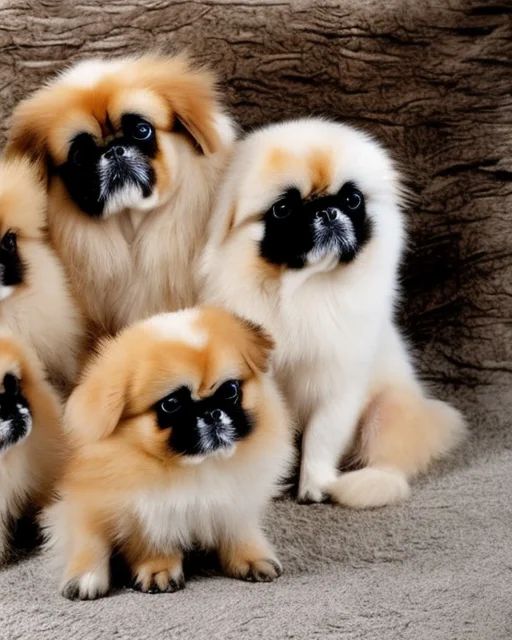"Stop Your Pekingese from Biting: Tips and Tricks for Happy and Well-Behaved Dogs
Hey there, fellow Pekingese owners! If you're anything like me, you know that these little pups are a joy to have around. But let's be honest, they can also be stubborn and sometimes prone to biting. Fear not, though, because I've got some tips and tricks to help you train your Pekingese not to bite.
First things first: socialization. You want to make sure your little buddy is comfortable around other dogs and people. Take them out to the park, the beach, the mall (yes, some places allow dogs). And don't forget to bring treats! Positive reinforcement is the key here. The more they associate new places and new people with good things, the less likely they are to lash out with their little teeth.
Speaking of positive reinforcement, that's the next step: training. Treats, toys, and praise will go a long way in getting your Pekingese to behave. When they do something good, let them know! Give them a pat on the head or a treat, and they'll be more likely to repeat that behavior. But don't be too stingy with the treats - nobody likes a miserly dog owner.
Now, let's talk playtime. Pekingese are playful dogs, but sometimes they can get a little too rough. They might see your hand or foot and think, "hey, that's a toy!" But no, buddy, those are attached to your body. Instead, give them toys that are meant for dogs to play with. Squeaky toys, ropes, balls - there are plenty of options out there. You might have to try a few before you find the one that your Pekingese really loves. Just like humans, every dog is different.
Of course, playtime and socialization aren't enough. You also need to make sure your Pekingese gets enough exercise and mental stimulation. This is especially important if you're living in a small apartment or don't have access to a backyard. Take them for walks, play games with them, and give them puzzles and toys that will challenge their minds. A bored Pekingese is a dangerous Pekingese.
If all else fails, don't hesitate to seek professional help. A dog trainer or behaviorist can help you figure out why your Pekingese is biting and how to fix the problem. They might suggest more advanced training techniques or even medication, if necessary. Don't be afraid to ask for help - it's better than having a dog that bites everyone who comes near it.
A training program that may be helpful is "Brain Training For Dogs".
Now, let's dive a little deeper into each of these tips.
Socialization:
Socializing your Pekingese from a young age is crucial to preventing biting and other behavioral issues. Pekingese are naturally suspicious of strangers, so exposing them to different people and situations from a young age will help them feel more comfortable in new situations. Make sure to introduce your Pekingese to people of all ages, sizes, and races, as well as other dogs, cats, and even other animals if possible. Keep in mind that socialization is an ongoing process, so continue to expose your Pekingese to new people and situations throughout their life.
Training:
Positive reinforcement training is one of the most effective ways to train your Pekingese not to bite. When your Pekingese does something good, reward them with treats, toys, or praise. When they do something wrong, don't punish them - instead, redirect their behavior to something positive. For example, if your Pekingese starts to bite your hand, give them a toy to chew on instead. Consistency is key when it comes to training, so make sure everyone in your household is on the same page when it comes to rules.
Playtime:
Pekingese are playful dogs, but they can sometimes mistake hands or feet for toys. To avoid this, give them plenty of toys to play with. There are all sorts of toys available, from soft plushies to hard chew toys. You can even make your own toys with items around your home, like an old t-shirt or a tennis ball. When playing with your Pekingese, make sure to use toys, and not your hands or feet. If they do try to bite during playtime, give them a stern "no" and redirect their attention to a toy instead.
Exercise and Mental Stimulation:
Just like humans, dogs need both physical and mental exercise to stay healthy and happy. Make sure to take your Pekingese for daily walks, and play games like fetch or hide-and-seek to get them moving. You can also give them puzzles or interactive toys that challenge their minds. This will help prevent boredom, which can lead to destructive behavior like biting.
Professional Help:
If your Pekingese continues to bite despite your best efforts, it may be time to seek professional help. A dog trainer or behaviorist can assess the situation and help you come up with a plan to correct the behavior. They may recommend more advanced training techniques, such as desensitization or counterconditioning, or even medication if necessary. Don't be afraid to ask for help - your Pekingese will thank you for it.
In conclusion, training your Pekingese not to bite takes patience and consistency. Socialize them from a young age, use positive reinforcement training, give them plenty of toys to play with, and make sure they get enough exercise and mental stimulation. And if all else fails, don't hesitate to seek professional help. With these tips, you'll have a well-behaved and happy Pekingese in no time.
Remember, always consult with a veterinarian or certified dog trainer before starting any training or behavior modification program.
References and Suggested Reading: (Click the link to view online):
- American Kennel Club Pekingese Breed Standard: https://www.akc.org/dog-breeds/pekingese/
- Pekingese Club of America: https://pekingeseclubofamerica.com/pekingese-breed-standard/
- Orthopedic Foundation for Animals: https://www.ofa.org/
- Traveling with your dog or cat. American Veterinary Medical Association. (n.d.). Retrieved March 16, 2023, from https://www.avma.org/resources-tools/pet-owners/petcare/cvi/traveling-your-dog-or-cat
- 10 tips for the first 30 days after adopting a dog. PetMD. (n.d.). Retrieved March 16, 2023, from https://www.petmd.com/dog/care/10-tips-first-30-days-after-adopting-dog
- The ultimate guide to traveling with dogs. The Social Movement. (2018, August 31). Retrieved March 16, 2023, from https://blog.konversai.com/ultimate-guide-traveling-dogs/
- WebMD. (n.d.). Traveling with dogs: Tips for safety and security. WebMD. Retrieved March 16, 2023, from https://pets.webmd.com/dogs/guide/how-to-travel-with-your-dog American Kennel Club. "Pekingese Dog Breed Information." https://www.akc.org/dog-breeds/pekingese/
- PetMD. "Pekingese Dog Breed Profile." https://www.petmd.com/dog/breeds/c_dg_pekingese
- Friends, M. F. (n.d.). Grooming a Pekingese. Retrieved March 27, 2023, from https://petgroomingthegoodthebadthefurry.blogspot.com/2011/05/grooming-pekingese.html
- YouTube. (2020, April 24). How to groom a Pekingese (basic trim) - do-it-yourself dog grooming. YouTube. Retrieved March 27, 2023, from https://www.youtube.com/watch?v=5JAFDKehD3U
- Dog training: How to train a dog & dog obedience training. American Kennel Club. (n.d.). Retrieved April 1, 2023, from https://www.akc.org/training
- Cunliffe, J. (2012). Pekingese: A comprehensive guide to owning and caring for your dog. Lumina Media. Pekingese: A Comprehensive Guide to Owning and Caring For Your Dog
- Pisano, B., & Krieger, G. A. (1990). Pekingese. T.F.H. Publications. Pekingese by Beverly Pisano
- Sife, W. (2014). The loss of a pet: A Guide to Coping with the Grieving Process When a Pet Dies. Howell Book House. The Loss of a Pet: A Guide to Coping with the Grieving Process When a Pet Dies
- Dunbar, I. (2004). Before & after getting your puppy: The positive approach to raising a happy, healthy, and well-behaved dog. New World Library. Before & after getting your puppy
- Borzendowski, J. (2007). Caring for your aging dog: A quality-of-life guide for your dog's senior years. Sterling Pub. Caring for your aging dog: A quality-of-life guide for your dog's senior years.
- Bendersky, J. (2014). Diy Dog Grooming, from puppy cuts to best in Show: Everything you need to know, step by step. Quarry. Diy Dog Grooming, from puppy cuts to best in Show: Everything your need to know, step by step
- Coile, D. C., & Earle-Bridges, M. (2006). Pekingese: Everything about purchase, care, nutrition, behavior, and training. Barron's. Pekingese: Everything about purchase, care, nutrition, behavior, and training. Barron's
- Yin, S. A., & Deamer, M. (2010). How to behave so your dog behaves. T.F.H. Publications. How to behave so your dog behaves
- McConnell, P. B. (2003). The other end of the leash: Why we do what we do around dogs. Ballantine Books. The other end of the leash why we do what we do around dogs
- Pryor, K. (2019). Don't shoot the dog: The art of teaching and training. Simon & Schuster Paperbacks. Don't Shoot the Dog: he Art of Teaching and Traini
- Fox Sports. (2021). Westminister Kennel Club Show 2021. YouTube. Retrieved April 16, 2023, from https://youtu.be/GZSIFekthRM.










Comments
Post a Comment